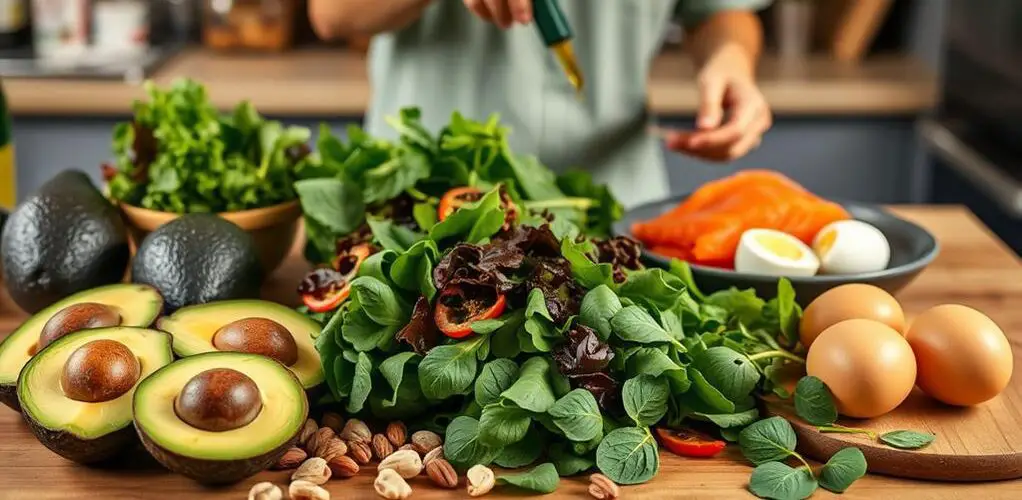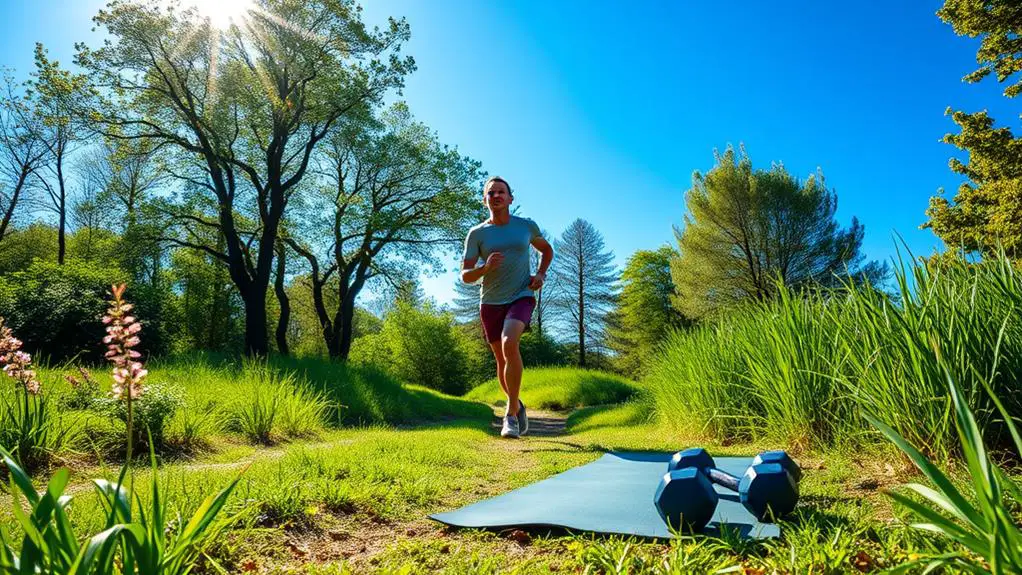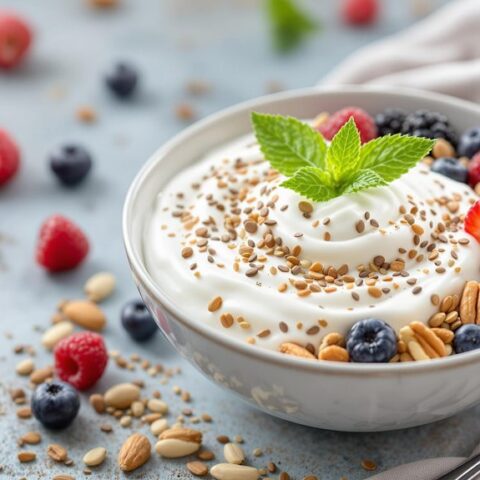
Starting a keto diet can seem tricky, but with these seven essential tips, you'll be a pro in no time! First, focus on healthy fats like avocados and nuts, making sure they make up most of your meals. Keep those carbs low—think 20 grams a day low—and swap regular noodles for zucchini ones. Stay active with fun exercises like dancing or biking, and drink lots of water to keep hydrated. Don't forget to get enough sleep and practice some chill activities like yoga to manage stress. Finally, plan ahead for social events so you're not tempted by high-carb foods. Ready to transform? Let's dive deeper!
Key Takeaways
- Limit net carbs to 20 grams daily for the first two weeks to achieve ketosis.
- Prioritize healthy fats like avocados, nuts, and olive oil, constituting 70-80% of your diet.
- Focus on whole, nutrient-dense foods, avoiding processed alternatives to optimize nutrition.
- Ensure proper hydration with 6-8 glasses of water daily and maintain electrolyte balance.
- Incorporate regular exercise and mindfulness practices to manage stress and support ketosis.
Understand Keto Diet Fundamentals
A fundamental understanding of the ketogenic diet is essential for those considering its adoption. The keto diet is all about shifting your body's fuel source from carbs to fats. This means eating a lot of healthy fats—think avocados, nuts, and olive oil—moderate amounts of protein, and very few carbs.
When your carb intake is super low, your body enters a state called ketosis. In ketosis, your liver makes ketones, which your brain and body use for energy instead of the usual glucose from carbs.
One of the biggest keto benefits is that it can help your body burn fat more efficiently. But there are keto misconceptions that need clearing up. Some people think it's all bacon and butter, but the diet emphasizes nutrient-dense, non-starchy veggies like spinach and broccoli.
It's not a free pass to eat junk food!
To start, keep your net carbs under 20 grams daily for the first two weeks. This helps get your body into ketosis.
Always talk to a doctor before starting, especially if you have health conditions or take medications. The keto diet can be powerful, but it's important to do it right!
Manage Your Carbohydrates
Managing your carbohydrates is essential on a keto diet, especially if you want to keep your body in ketosis.
Start by limiting your net carbs to 20 grams or fewer each day for the first two weeks, which might sound tough, but think of it as a challenge!
Focus on whole, nutrient-rich foods like kale and spinach, and remember to swap high-carb foods for low-carb options, like using zucchini noodles instead of pasta.
Limit Net Carbs
Achieving successful ketosis hinges on meticulously managing your carbohydrate intake. To get started, you need to focus on limiting your net carbs. This involves carb counting to guarantee you consume 20 grams or fewer per day during the first two weeks of the ketogenic diet. This strict limit helps your body switch from burning glucose to burning fat for energy.
After the initial phase, you can slowly reintroduce small amounts of net carbs to see how much you can handle without kicking yourself out of ketosis. It's like a science experiment, but for your body!
Stick to nutrient-dense, non-starchy vegetables like kale, broccoli, and spinach. These veggies are packed with vitamins and minerals and keep your carb counts low.
Don't forget about hidden sugars and carbs lurking in processed foods. Always check nutrition labels to stay on track.
Low-carb substitutions are your best friends—think zucchini noodles or cauliflower rice. These swaps keep meals interesting without blowing your carb budget.
Emphasize Whole Foods
To optimize your ketogenic journey, prioritizing whole foods over processed alternatives is essential. Focusing on nutrient-dense, non-starchy vegetables like kale, broccoli, and spinach helps manage carbohydrate intake while ensuring you get vital vitamins and minerals. These greens are your best friends, packing a punch without the carbs.
Limiting your net carbohydrate intake to 20 grams or fewer daily during the first two weeks is a game-changer. This restriction helps you enter ketosis, where your body burns fat for fuel. Meal planning becomes your secret weapon, making sure you stick to low-carb options and avoid sneaky sugars.
Low-carb substitutes like zucchini noodles or cauliflower rice can make your meals exciting without blowing your carb budget. They're not just tasty but also versatile, letting you enjoy your favorite dishes in a keto-friendly way.
Reading nutrition labels is a must. Hidden sugars and total carb counts can trip you up if you're not careful.
Sticking to whole foods over processed ones can help you avoid cravings and feel fuller longer, making it easier to stick with your low-carb lifestyle. Embrace the power of whole foods and watch your keto journey thrive!
Reduce Stress Levels
Starting a keto diet can be exciting, but managing stress is essential to your success.
Getting enough sleep, around 7-9 hours each night, and sticking to a regular bedtime helps keep your energy up and cravings down.
Add in some exercise and mindfulness practices like yoga or meditation to keep stress levels low and help your body adjust smoothly.
Prioritize Quality Sleep
Maintaining quality sleep is essential for those starting on a keto diet, as it plays a pivotal role in regulating cortisol levels and supporting metabolic processes. Good sleep hygiene is a must, which means having a regular bedtime and creating a sleep environment that's cool, dark, and quiet. Aim for 7-9 hours of sleep each night. Not enough sleep can lead to increased hunger and cravings, making it harder to stick to your keto goals.
Establishing a consistent bedtime routine helps set your internal clock, making it easier to fall asleep and wake up refreshed.
Try relaxing activities like reading, meditation, or yoga before bed—they can greatly reduce stress levels, which is great for both sleep and your keto journey. High-stress periods can make it tough to get into ketosis, so it might be a good idea to start your keto diet during a less stressful time.
Exercise Regularly
Incorporating regular exercise into your routine is a cornerstone of successfully adapting to a keto diet. Exercise helps deplete glycogen stores more quickly, making it easier for your body to shift to burning fat. Plus, regular physical activity can greatly reduce stress levels, which is essential because high cortisol can hinder ketosis and spike blood sugar levels.
Start with low-intensity workouts like walking or yoga, especially during the initial stages of your keto journey. These activities are gentle on your body, helping you adapt to dietary changes without overwhelming your system.
Over time, consider adding strength training exercises twice a week. Strength training not only builds muscle but also boosts your metabolism, aiding in weight loss and overall health.
Aim for at least 150 minutes of moderate aerobic activity each week. This could be anything from a brisk walk to a fun dance class. Engaging in these activities can also improve your sleep quality, which further supports your body's ability to maintain ketosis and reduces stress-related cravings.
Practice Mindfulness Techniques
Moving into a ketogenic lifestyle can be stressful, making it essential to harness mindfulness techniques to keep cortisol levels in check. High cortisol can hinder ketosis and raise blood sugar, so reducing stress is vital. Practicing mindfulness benefits such as meditation and yoga can help you relax and ease into your new diet.
Meditation techniques are super effective for calming the mind. Just a few minutes of deep breathing can make a big difference. Yoga is also great; it not only reduces stress but also keeps you flexible and strong. Both practices support a smoother shift into ketosis.
| Mindfulness Practice | Benefits |
|---|---|
| Meditation | Reduces stress, calms mind |
| Yoga | Enhances relaxation, improves flexibility |
| Regular Sleep | Regulates cortisol, boosts energy |
Getting enough sleep is another key to keeping stress in check. Aim for 7-9 hours per night. Having a consistent bedtime schedule can improve sleep quality, making you feel more rested and less stressed.
Physical activity, like walking or low-intensity workouts, also helps. It keeps you active and lowers stress, making it easier to stick to your keto diet. So, remember, mindfulness benefits aren't just about sitting still—they're about moving and resting well, too!
Focus on Healthy Fats
A cornerstone of the ketogenic diet is the strategic inclusion of healthy fats, which should constitute 70% to 80% of your daily caloric intake. This means you'll be eating lots of fat sources like avocados, olive oil, and fatty fish such as salmon.
These foods not only taste great but also pack a punch in nutrient density, giving your body the essential nutrients it needs to thrive.
But hey, don't just stick to the basics—variety is the spice of life! Experiment with different healthy fat sources. Try coconut oil for cooking or add a splash of heavy cream to your coffee.
Including moderate amounts of dairy like cheese can also be a tasty way to boost your fat intake without going over your carb limits.
One thing to watch out for, though, is unhealthy fats. Trans fats and hydrogenated oils are big no-nos. They can mess with your heart health and might even kick you out of ketosis.
So, stick to the good stuff, and your body will thank you.
Mixing things up keeps your meals interesting and guarantees you're getting a well-rounded intake of essential fatty acids and nutrients. Happy eating!
Stay Active and Exercise

Staying active and incorporating regular exercise into your routine is essential for optimizing the benefits of the ketogenic diet. Regular exercise enhances fat burning and helps deplete glycogen stores, making it easier to enter and maintain ketosis, especially during the initial stages. Mixing in keto workouts such as walking or yoga with strength training can support muscle retention even when you're cutting calories.
Starting slow is key. Gradually increasing the intensity and duration of your workouts helps avoid fatigue and keeps your energy levels steady. Plus, exercising can help fight off the dreaded "keto flu." You know, that yucky feeling when you first start keto? Exercise boosts endorphins, making you feel happier and more energetic.
Aim for at least 150 minutes of moderate aerobic activity per week. That's just about 30 minutes a day, five days a week. Not too tough, right? This can promote overall health and help with weight loss while on keto.
Prioritize Hydration
Hydration is paramount on the ketogenic diet, as the reduction in carbohydrate intake can greatly increase water loss. When you cut carbs, your body sheds water rapidly, so gulping down 6-8 glasses daily is essential.
And if you're sweating it out in the gym or under the sun, you might need even more.
Without enough fluids, you could face constipation, dizziness, and those pesky cravings. No one wants that, right? So, let's talk hydration strategies. Keep a water bottle handy and sip throughout the day.
And here's a fun trick: check your pee! Light yellow means you're good, while darker shades scream, "Drink more water!"
But it's not just water you need. Electrolyte balance is key too. Low-carb diets can throw your sodium, potassium, and magnesium levels out of whack.
Navigate Social Situations

Maintaining proper hydration is just one aspect of successfully adhering to a ketogenic diet. Maneuvering through social situations can be tricky, but with a little planning, you can stick to your keto goals without feeling left out.
When dining out, check restaurant reviews and menus in advance for keto-friendly options. Look for meals that feature grilled meats and vegetables, and skip starchy sides like potatoes and bread. Simple dishes like salads with olive oil or avocado are great choices, but watch out for hidden sugars in sauces.
At social gatherings, it's smart to bring your own low-carb snacks or meals. This way, you won't be tempted by carb-laden foods like chips and dips. Veggie platters can be a lifesaver, offering a crunchy, satisfying alternative to less healthy snacks.
Communicating your dietary preferences to friends and family can also help. Let them know about your keto goals, and you might be surprised by the support you receive.
Using low-carb alternatives for common party foods can make a big difference. With a bit of creativity and planning, you can enjoy social events without straying from your diet.
Frequently Asked Questions
How Do I Start My Keto Diet for the First Time?
To start your keto diet effectively, limit carbohydrate intake to 20-50 grams per day and emphasize healthy fats. Engage in keto shopping and meal prepping by creating a grocery list of keto-friendly foods and planning balanced meals.
What Should I Have First in the Morning on a Keto Diet?
For a keto breakfast, consider high-fat options like scrambled eggs in butter or coconut oil, avocado, or Greek yogurt with chia seeds. Alternatively, a nutrient-dense smoothie or bulletproof coffee can provide essential morning fat sources.
What Is the Best First Meal for Keto?
The best first meal for keto includes keto breakfast ideas such as an avocado and egg breakfast, a spinach and cheese omelet, a low-carb smoothie, or chia seed pudding, all of which are excellent low carb recipes.
What Are the 9 Rules of Keto?
The nine rules of keto include limiting carbs, following macronutrient ratios, incorporating healthy fats, staying hydrated, monitoring body response, avoiding keto misconceptions, engaging in keto meal prepping, consulting healthcare professionals, and maintaining consistency for best results.
Conclusion
Starting a keto diet journey involves understanding its fundamentals, managing carbohydrate intake, and focusing on healthy fats. Reducing stress, staying active, and prioritizing hydration are vital for success. Steering through social situations with confidence further guarantees adherence to the diet. By following these seven essential tips, beginners can effectively shift into the keto lifestyle and reap its potential benefits. Commitment and informed choices will lead to a successful and sustainable ketogenic experience.










No Comments